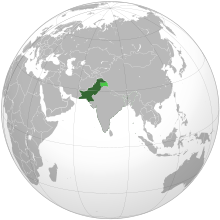Fixing Pakistan’s Civil-Military Imbalance – Analysis
By IPCS
By Rana Banerji
The timing of Moeed Yousuf’s paper counselling against any deliberate accentuation of the civil-military divide in Pakistan is intriguing, especially when US-Pakistan relations are at an unprecedented nadir and domestic consternation in Pakistan over the `Memogate’ affair has almost run its course. The National Assembly Speaker, Fehmida Mirza’s ruling not to refer Prime Minister Yousuf Raza Gilani’s disqualification by the Supreme Court on charges of contempt of court to the Election Commission confirms the Pakistan Peoples Party’s intention to fight the the higher Judiciary and the Army politically.

Why should Yousuf be telling the US policy makers to tone down their new found love for `civilian democrats’ now, especially since no one needed reminding when the US made its peace with military dictators, who repeatedly abrogated the democratic process, but continued to receive substantial US financial and military assistance to sustain geo-political and strategic compulsions of the Pakistani State.
Responding to Bruce Riedel’s New York Times article (A new Pakistan policy-Containment, 14 October 2011), Yousuf concludes that any attempt to play civilian politicians against the Army would only strengthen the Islamic right wing and intensify anti-American feelings in Pakistan. He argues that this approach would not elicit sufficient `resonance’ from the people in general, as they still tend to respect the Army, despite the fiasco of the Osama bin Laden episode last year. Civilian politicians in Pakistan have been discredited over charges of bad governance as the public remains more concerned with output, and less with the process of governance.
Pitting civilians against military over issues of national security was not going to fetch any political mileage either for the Americans. The civilians in Pakistan’s policy making elite are as much against US exhortations to ‘do more’ against ‘terrorists’ in North Waziristan as the Army. The recent Parliamentary review of foreign policy parameters was quite hawkish. There seems to be broad consensus on Afghanistan, Pakistan’s position on Kashmir, the need to maintain China’s position as its top ally, retain its nuclear capability and seek energy collaboration with Iran. No political party in Pakistan can afford to be caught asking the US for help to curb the Army’s primacy.
Instead, Yousuf suggests ‘a wiser approach’ of ‘targeted interventions’ in ‘areas that lie at the heart of the civil-military divide and resonate more positively’ with the people. Any transformation in the civil-military relationship would have to come from within, driven by organic institutional processes, ‘which would ultimately squeeze the military’s space for political manouvering’. The rise of an independent media, increasing judicial activism and a more active Parliament are hopeful signs. Regional security assurances from the US to bring the ‘forward movement’ or ‘transformational gains’ to Pakistan vis-a vis India could help.
Yousuf conveniently overlooks how the military has often held the civilian government hostage, to push its own agenda in Afghanistan or Kashmir, even as lingering introspection occasionally surfaces from the vestiges of a besieged liberal intelligentsia, sporadically questioning these miscalculations. As pointed out recently by his irrepressible compatriot, Kamran Shafi (Another rubbish USIP report, The Express Tribune, 25 May 2012), Yousuf does not ask why the Americans have kept on paying directly to `the Pakistani Deep State’ without any accountability of this aid or its diversion to unauthorised `image building’ ventures. Shafi also questions Yousuf’s somewhat artificial distinction between `elected’ and `democratic’ governments and the differing popular expectations from them. Also, the labelling of Imran Khan’s Tehrik-e-Insaaf as ‘a genuinely popular’ party appears naïve and indicative of an urban bias.
The USIP paper presents one more example perhaps, of what Ayesha Siddiqa describes as a `new effort to legitimise’ the `political and religious right’ through `a post-modernist scholars’ narrative, which seeks to justify the alliance of an emerging urbanised middle class with militant neo-nationalist radicalism (Pakistan’s modernity: Between the Military & Militancy, Economic & Political weekly, 17 December 2011). While traditional modernists in Pakistan of the 1960s & 1970s believed religion was essential for the State’s identity, it should be followed in a more liberal form. This has changed now, as post-modernists are of the view that radical elements should be allowed to pursue their agenda. This would eventually lead to a toning down of religious rhetoric and the society becoming more inclusive. This is a` dangerous brew’ as evident from the impact of a more militant version of Deobandi- Wahabi Sunni Islam on the Barelvi Sufi influenced religious norms. The Barelvi clerics in Pakistan have increasingly come under pressure to regain lost ideological space by preaching a more militant discourse.
In Pakistan’s case, the rise in Islamic militancy remains directly linked to State support- be it from the military or from civilian political leaders. Unless this nexus is consciously dismantled, the transformation through organic processes from within, as expected by Moeed Yousuf, is unlikely to occur anytime soon.
Rana Banerji
Distinguished Fellow, IPCS & Special Secretary (Retd), Cabinet Secretariat
email: [email protected]
